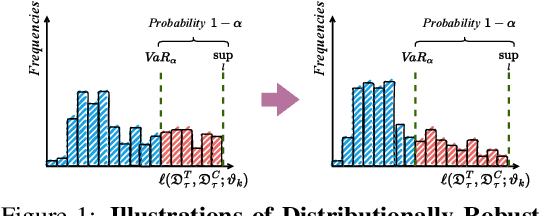A Simple Yet Effective Strategy to Robustify the Meta Learning Paradigm
Paper and Code
Oct 01, 2023



Meta learning is a promising paradigm to enable skill transfer across tasks. Most previous methods employ the empirical risk minimization principle in optimization. However, the resulting worst fast adaptation to a subset of tasks can be catastrophic in risk-sensitive scenarios. To robustify fast adaptation, this paper optimizes meta learning pipelines from a distributionally robust perspective and meta trains models with the measure of expected tail risk. We take the two-stage strategy as heuristics to solve the robust meta learning problem, controlling the worst fast adaptation cases at a certain probabilistic level. Experimental results show that our simple method can improve the robustness of meta learning to task distributions and reduce the conditional expectation of the worst fast adaptation risk.
 Add to Chrome
Add to Chrome Add to Firefox
Add to Firefox Add to Edge
Add to Edge